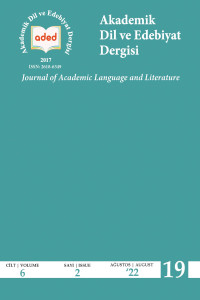Abstract
Poetry collections allow the unknown poems of poets who entered biographical sources to come to light as well as their known poems. At the same time, poetry collections also allow the emergence of poets and their poems that are not included in biographical sources for various reasons. The story of Rind ü Zâhid, which is included in this article, was also found in a journal in the Leibzig University Library, registered with its B. or. 73 tag. The poets whose poems are in the journal consist of poets who almost lived in the 16th and 17th centuries. Although it cannot be determined exactly which of the poets who lived in the mentioned centuries, Kadri, who is the author of the story is, some inferences have been made. It would be appropriate to add Kadrî's Turkish story in the form of masnavi to the Rind ü Zâhid themed work, the only example of which in Turkish literature belongs to Fuzûlî, written in prose and in Persian. Zâhid and rind personalities are seen in the representation of father and son in Fuzûlî's work. But it is not possible to say this for Kadri's work. In his work, zahid and rind are handled as two opposite characters, who are in constant conflict in classical eastern literatures. The story, written in mathnavi form, consists of 74 couplets. In the article, which also includes the transcription text, this story has been tried to be examined in terms of form and content.
Keywords
References
- Aktaş, Ş. (2013). Anlatma esasına bağlı edebi metinlerin tahlili (teori ve uygulama). Kurgan Edebiyat Yayınları.
- Ayan, H. (1993). Rind ile zahid, Fuzulî. MEB Yayınları.
- Ekinci, R. (2014, 22 Şubat). Kadrî, Receb Efendi. Türk Edebiyatı İsimler Sözlüğü. http://teis.yesevi.edu.tr/madde-detay/kadri-receb-efendi
- Kaplan, Y. (2014, 10 Temmuz). Kadrî Bey. Türk Edebiyatı İsimler Sözlüğü. http://teis.yesevi.edu.tr/madde-detay/kadri-kadri-bey
- Karagözlü, V. (2014, 2 Nisan). Kadrî, Abdülkadir, Şeyhülsilam Abdülkadir Efendi. Türk Edebiyatı İsimler Sözlüğü. http://teis.yesevi.edu.tr/madde-detay/kadri-abdulkadir-seyhulislam-abdulkadir
- Köksal, M. F. (2013, 9 Eylül). Kadrî. Türk Edebiyatı İsimler Sözlüğü. http://teis.yesevi.edu.tr/madde-detay/kadri
- Külahlıoğlu, M. (1997). Kadrî hayatı, edebî kişiliği ve divanının transkripsiyonlu metni (Tez No.61540) [Yüksek Lisans Tezi, Selçuk Üniversitesi]. YÖK Tez Merkezi https://tez.yok.gov.tr/UlusalTezMerkezi/tezSorguSonucYeni.jsp
- Mecmua, Leibzig Üniversitesi Kütüphanesi (Universitätsbibliothek Leibzig) B. or. 73.
- Sucu, N. (2004). Sâlim, hayatı, edebi kişiliği, eserleri ve Rind ü Zâhid tercümesi (inceleme-metin) (Tez No.148334) [Yüksek Lisans Tezi, Selçuk Üniversitesi]. YÖK Tez Merkezi. https://tez.yok.gov.tr/UlusalTezMerkezi/tezSorguSonucYeni.jsp
- Sucu, N. (2007). Sâlim ve muhâvere-i Rind ü Zâhid adlı eseri. TÜBAR XXII, 119-148.
- Şentürk, A. A. (1996). Klasik Osmanlı edebiyatı tiplerinden sûfî yahut zâhid hakkında. Enderun Kitabevi.
- Yılmaz K. H. (2014, 5 Aralık). Kadrî Çelebi. Türk Edebiyatı İsimler Sözlüğü. http://teis.yesevi.edu.tr/madde-detay/kadri-kadri-celebi
- Yılmaz K. H. (2014, 11 Aralık). Kadrî, Suûdizâde Seyyid Abdülkadir b. Mir Hasanzâde Suûdî Mehmed Efendi. Türk Edebiyatı İsimler Sözlüğü. http://teis.yesevi.edu.tr/madde-detay/kadri-suudizade-seyyid-abdulkadir
Abstract
Mecmualar, biyografik kaynaklara girmiş şairlerin bilinen şiirlerinin yanında bilinmeyen şiirlerinin de gün yüzüne çıkmasına imkân sağlar. Aynı zamanda mecmualar, çeşitli nedenlerle biyografik kaynaklarda kendilerine yer verilmeyen şairlerin ve onların şiirlerinin de ortaya çıkmasına imkân sağlar. Bu yazıda yer verilen Rind ü Zâhid hikâyesi de Leibzig Üniversitesi Kütüphanesi’nde bulunan B. or. 73 künyesiyle kayıtlı olan bir mecmuada bulunmuştur. Mecmuda şiirleri bulunan şairler, büyük çoğunlukla 16. ve 17. asırlarda yaşamış şairlerden oluşmaktadır. Hikâyenin müellifi olan Kadrî’nin söz konusu asırlarda yaşamış şairlerden hangisi olduğu tam olarak tespit edilememekle birlikte, birtakım çıkarımlarda bulunulmuştur.
Günümüze değin Türk edebiyatında tek örneği Fuzûlî’ye ait, mensur ve Farsça yazılmış olan Rind ü Zâhid temalı esere, Kadrî’nin mesnevi formundaki Türkçe hikâyesini de eklemek yerinde olacaktır. Zâhid ve rind tipleri Fuzûlî’nin eserinde baba ve oğul temsilinde görülmektedir. Ancak Kadrî’nin eseri için bunu söylemek mümkün değildir. Onun eserinde zâhid ile rind, daha çok klasik doğu edebiyatlarında sürekli birer çatışma hâlinde olan iki zıt karakter niteliğinde işlenmektedir. Mesnevi nazım şekliyle kaleme alınan hikâye 74 beyitten oluşmaktadır. Transkripsiyonlu metnine de yer verilen makalede, bu hikâye şekil ve içerik açısından incelenmeye çalışılmıştır.
Keywords
References
- Aktaş, Ş. (2013). Anlatma esasına bağlı edebi metinlerin tahlili (teori ve uygulama). Kurgan Edebiyat Yayınları.
- Ayan, H. (1993). Rind ile zahid, Fuzulî. MEB Yayınları.
- Ekinci, R. (2014, 22 Şubat). Kadrî, Receb Efendi. Türk Edebiyatı İsimler Sözlüğü. http://teis.yesevi.edu.tr/madde-detay/kadri-receb-efendi
- Kaplan, Y. (2014, 10 Temmuz). Kadrî Bey. Türk Edebiyatı İsimler Sözlüğü. http://teis.yesevi.edu.tr/madde-detay/kadri-kadri-bey
- Karagözlü, V. (2014, 2 Nisan). Kadrî, Abdülkadir, Şeyhülsilam Abdülkadir Efendi. Türk Edebiyatı İsimler Sözlüğü. http://teis.yesevi.edu.tr/madde-detay/kadri-abdulkadir-seyhulislam-abdulkadir
- Köksal, M. F. (2013, 9 Eylül). Kadrî. Türk Edebiyatı İsimler Sözlüğü. http://teis.yesevi.edu.tr/madde-detay/kadri
- Külahlıoğlu, M. (1997). Kadrî hayatı, edebî kişiliği ve divanının transkripsiyonlu metni (Tez No.61540) [Yüksek Lisans Tezi, Selçuk Üniversitesi]. YÖK Tez Merkezi https://tez.yok.gov.tr/UlusalTezMerkezi/tezSorguSonucYeni.jsp
- Mecmua, Leibzig Üniversitesi Kütüphanesi (Universitätsbibliothek Leibzig) B. or. 73.
- Sucu, N. (2004). Sâlim, hayatı, edebi kişiliği, eserleri ve Rind ü Zâhid tercümesi (inceleme-metin) (Tez No.148334) [Yüksek Lisans Tezi, Selçuk Üniversitesi]. YÖK Tez Merkezi. https://tez.yok.gov.tr/UlusalTezMerkezi/tezSorguSonucYeni.jsp
- Sucu, N. (2007). Sâlim ve muhâvere-i Rind ü Zâhid adlı eseri. TÜBAR XXII, 119-148.
- Şentürk, A. A. (1996). Klasik Osmanlı edebiyatı tiplerinden sûfî yahut zâhid hakkında. Enderun Kitabevi.
- Yılmaz K. H. (2014, 5 Aralık). Kadrî Çelebi. Türk Edebiyatı İsimler Sözlüğü. http://teis.yesevi.edu.tr/madde-detay/kadri-kadri-celebi
- Yılmaz K. H. (2014, 11 Aralık). Kadrî, Suûdizâde Seyyid Abdülkadir b. Mir Hasanzâde Suûdî Mehmed Efendi. Türk Edebiyatı İsimler Sözlüğü. http://teis.yesevi.edu.tr/madde-detay/kadri-suudizade-seyyid-abdulkadir
Details
| Primary Language | Turkish |
|---|---|
| Subjects | Literary Studies |
| Journal Section | Articles |
| Authors | |
| Publication Date | August 30, 2022 |
| Submission Date | July 21, 2022 |
| Acceptance Date | August 8, 2022 |
| Published in Issue | Year 2022 Volume: 6 Issue: 2 |
This work is licensed under Attribution-NonCommercial 4.0 International


